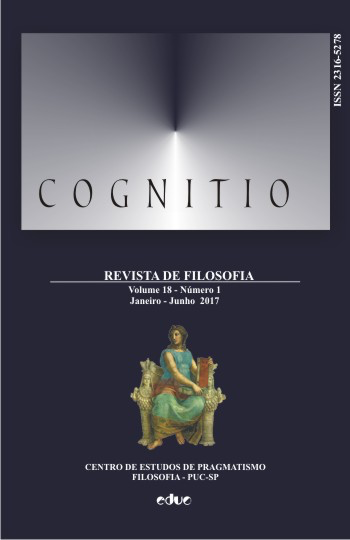Materialismo no limbo: Demócrito, Santayana e a ética da Metafísica
DOI:
https://doi.org/10.23925/2316-5278.2017v18i1p135-144Palavras-chave:
Santayana, Diálogos no Limbo, Metafísica pragmática, Psicologia, Autoconhecimento,Resumo
Neste artigo, argumento que a marca de uma metafísica viável é tanto prática e ética quanto é lógica e sistemática. Para tal, analiso os Diálogos no Limbo de George Santayana, no qual ele afirma seu apoio ao materialismo atomístico de Demócrito em bases pragmáticas. Uma metafísica, ele sugere, é uma visão de mundo que acomoda uma pessoa – vista como um determinado tipo de organismo psicológico – sabiamente às forças da natureza e da melhor forma possibilita essa pessoa a levar uma vida próspera. Ao mesmo tempo, Santayana coloca sua marca no materialismo ao questionar a possibilidade da caracterização geométrica dos átomos de Demócrito ser uma explicação literal da substância material. Ele interpreta a metafísica Democritiana como uma posição poética e mitológica que desconsidera a experiência subjetiva e, em vez de, volta nossa atenção para as origens substrativas do nosso ser.Downloads
Publicado
2017-07-10
Como Citar
Wahman, J. (2017). Materialismo no limbo: Demócrito, Santayana e a ética da Metafísica. Cognitio: Revista De Filosofia, 18(1), 135–144. https://doi.org/10.23925/2316-5278.2017v18i1p135-144
Edição
Seção
Artigos Cognitio









